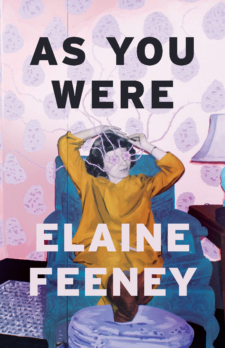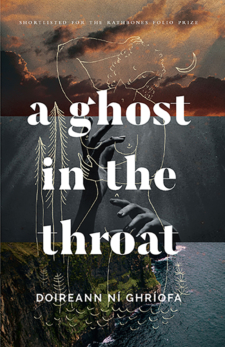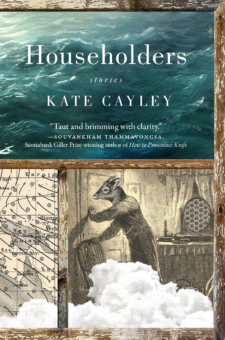Description
Shortlisted for the An Post Irish Book Awards Novel of the Year • An RTÉ Best Irish Book of 2025 • An Observer, Irish Times, and Sunday Times Ireland Preview Selection • A Globe and Mail Fall Book of 2025 • A Globe 100 Best Book of 2025
The Booker-nominated author of How to Build a Boat returns to western Ireland with a multi-generational family story about grief, inheritance, and learning to live with the past—and with yourself.
Claire O’Connor is a promising writer who left the family’s struggling farmstead in western Ireland for London, swearing never to return. But after the unexpected death of her mother, she is racked with grief, and when her father is diagnosed with cancer, she decides to return home to care for him, destroying everything she’d so carefully built up in the process. The pandemic follows, and Claire falls into a comfortable routine, one increasingly shaped by a growing obsession: the lives of the 20-something trad wives she discovers on social media. When Tom, her lost London love, unexpectedly shows up the next town over, her anxieties and obsessions collide, the resulting conflict forcing Claire and her brothers to finally deal with their family’s historic trauma—a trauma whose evidence is carved into the beams of the family home and the stone floors upon which their ancestors bled.
Ranging through recent Irish history, Let Me Go Mad in My Own Way is Elaine Feeney’s most ambitious novel to date, a work of literary and cultural exorcism and a profound exploration of family, history, violence, and hope.
Praise for Let Me Go Mad in My Own Way
“The Irish author’s follow-up to the Booker-nominated How to Build a Boat involves a woman who, in the wake of her mother’s death and her father’s cancer diagnosis, returns from London to her family’s struggling farmstead in western Ireland, where she confronts her past while adjusting to the rhythms of rural life during the pandemic.”
—Emily Donaldson, Globe and Mail
“In Let Me Go Mad in My Own Way, [Feeney] tells the story of Claire O’Connor, a woman who moves from London back home to Ireland, outside Galway, to deal with the death of her mother. Tom, her former boyfriend in England, suddenly moves in nearby, a development that Claire says ‘felt like a trespass.’ But this setup of domestic suspense is just the foundation on which Feeney builds a sprawling family tale that spans a century of Irish history.”
—Washington Post
“With richly textured description, Feeney takes readers through several layers of troubled Irish history and suffering across generations.”
—Gordon Arnold, Winnipeg Free Press
“A funny account of a social media-influenced woman trying to find love after moving back from London to the west and, as the past leaks into the present, a moving examination of female roles in Irish society now and then. The concerns of the present placed in sharp relief against events years earlier, when ‘laughing without caution’ was a luxury. It’s also a meditation on grief and, as generational wounds are reopened, asks how much can be explained, but not excused, by residual trauma.”
—Pat Carty, Hot Press
“With arresting imagery and skillful shifts in perspective, Feeney weaves together these narrative threads to gut-wrenching effect . . . the novel culminates in an avalanche of savage scenes and revelations. It’s a potent drama of a family shaped by a nation in upheaval.”
—Publishers Weekly
“Feeney’s dark novel, which explores personal loss, intergenerational trauma, political violence, and women’s victimization in a patriarchal society . . . [is an] absorbing . . . dramatic saga.”
—Kirkus Reviews
“Powerful . . . Questions of revolution, restitution and, perhaps, resolution swirl in the unsettled mix of this visceral, stimulating tale that is likely one of the most original you’ll read.”
—Daily Mail
“A powerful, poignant book.”
—The Economist
“Elaine Feeney’s multigenerational saga brings out themes of redemption and renewal against the backdrop of Ireland’s violent past.”
—Stefanie Milligan, Christian Science Monitor
“Feeney weaves experimental, inserting into her clean line of chapters bright cards of the past . . . a fast-paced, lively novel . . . In its blend of plot-excitement and psychological portrait, the book has something for everyone.”
—D.W. White, West Trade Review
“Feeney is a masterful writer. Her sinuous prose is powerful, poetic, arresting, intuitive and persuasive . . . This is a seriously wonderful book.”
—Sue Gaisford, The Tablet
“Feeney’s astute lyricism makes for a marvellously engaging story of a woman on the verge.”
—Eithne Farry, Irish Mail on Sunday
“An ambitious, thoughtful, nicely layered book.”
—Éilís Ní Dhuibhne, Irish Times
“Rich in history and drama, Let Me Go Mad in My Own Way reveals the legacies of violence and redemption as the secrets of the past unfold.”
—Leo Powell, Irish Farmers Journal
“In presenting both a political and personal history, Feeney delivers a moving meditation on enforced female roles in Irish society both past and present, the heavy pall of grief and the unceasing encroachment of the past into the present.”
—Pat Carty, Irish Independent
“Hugely satisfying . . . the novel’s baggy, complex, unfolding structure offers rich rewards.”
—Barney Norris, The Guardian
“A masterclass in Irish storytelling . . . What makes Feeney’s characterisation so refreshing is that she doesn’t expect her reader to like—much less root for—her protagonist; preferring instead to insinuate self-examination from her audience.”
—James Patterson, RTÉ
“Feeney reaches from a stagnant present to a troubled past, with an uncanny understanding of the workings of the human heart. I loved this book.”
—Louise Kennedy, author of Trespasses
“This is a clear-eyed and deep-hearted calibration of accumulating trauma, which Feeney skillfully conveys the scope and heft of while considering what it might take to halt it in its devastating tracks . . . a driven, tenacious, and probing narrative, made up of deeply expressive sentences that bristle and ache. Curious, sensitive, and unfeignedly visceral, Let Me Go Mad in My Own Way packs an intellectual and emotional punch as it asks that most difficult of questions—What now?”
—Claire-Louise Bennett, author of Pond
“A superb, multi-generational story told in stunning, poetic prose. Elaine Feeney is one of Irish literature’s most gifted and persuasive storytellers.”
—Sinéad Gleeson, author of Hagstone
“In Let Me Go Mad in My Own Way, Feeney expertly balances light and darkness, in a story that grips and engages on every page. A remarkably intimate novel that still dares to be expansive, allowing its ideas their full breaths. Feeney’s sentences have a sizzling, electric quality: energetic, charged with humour and anger, reinvigorating and unexpected, not a word is out of place. An exquisite novel, that will stay with me for a long time. I loved it so.”
—Jenny Mustard, author of What A Time To Be Alive
“This book touched my soul. It tells the story of a woman searching for home, and healing. It moves between the past and the present, highlighting the dark histories of rural Ireland, and its men. A perfect depiction of the complicated relationships we have with ourselves and our histories.”
—Katriona O’Sullivan, author of Poor
“This novel lulls the reader with its lyrical beauty, then slowly devastates with its raw passion and pain. Feeney shows how the political is always personal, and how the legacy of violence and trauma continues to wreak havoc on people’s lives. Shocking, intelligent and full of humanity, this is a story for our times.”
—Mary Costello, author of Academy Street
“Let Me Go Mad In My Own Way is proof, if any was needed, that [Feeney] is one of the finest writers of her generation. This book moves effortlessly through humour, tragedy and devastation with great formal inventiveness. It is a brilliant exploration of how violence, oppression and hatred, both personal and political, can warp and overshadow a life . . . Feeney will break your heart with her characters but she will also lovingly put it back together again.”
—Edel Coffey, author of Breaking Point
“Much will be said about Feeney’s warmth, compassion and bravery on the page, but even beyond such achievements, her writing is so natural, so apparently effortless, that it seems at times miraculous.”
—Lisa McInerney, author of The Glorious Heresies
“An astonishing achievement—a book that illuminates in a wholly fresh and innovative manner how echoes of violence echo down the family line, shifting realities in the present tense . . . It’s also a vivid, witty and moving read told in Feeney’s inimitable style, with an ensemble of unforgettable characters at its heart.”
—Jessica Traynor, author of Pit Lullabies
“Threads together small everyday truths with vast, overarching, horrifying, revelatory ones—property, work, what writing is for, homes and their ghosts, what it means to be part of a nation reborn from violence that is never really far away . . . Reading it feels at once like a beautiful digressive trip through modern life, and a far-wider-reaching, wildly ambitious vision of what it means to be Irish and a person right now.”
—Roisin Kiberd, author of The Disconnect
Praise for How to Build a Boat
“The interweaving stories of Jamie, a teenage boy trying to make sense of the world, and Tess, a teacher at his school, make up this humorous and insightful novel about family and the need for connection. Feeney has written an absorbing coming-of-age story which also explores the restrictions of class and education in a small community. A complex and genuinely moving novel.”
—The Booker Prize 2023 judges
“Atmospheric . . . Feeney’s prose is both careful and relaxed—detailed in its description of place and character and of the effortful human urge to find order in the natural world; casual in its approach to storytelling.”
—Sophie Ward, New York Times
“Harrowing and brilliant.”
—New York Magazine
“One of those rare books that leaves you feeling less lonely. An uplifting tale of community, healing and the small connections that can change a life. A gorgeous gift of a novel, hopeful and full of humanity.”
—Douglas Stuart, Booker Prize winning author of Shuggie Bain












